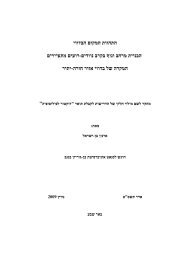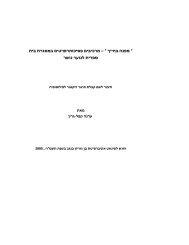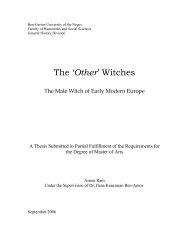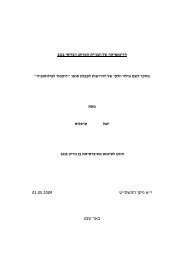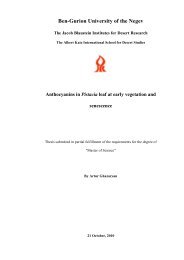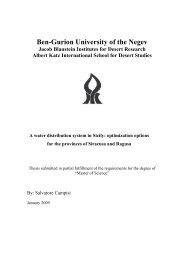רוח חן - אוניברסיטת בן-גוריון בנגב
רוח חן - אוניברסיטת בן-גוריון בנגב
רוח חן - אוניברסיטת בן-גוריון בנגב
You also want an ePaper? Increase the reach of your titles
YUMPU automatically turns print PDFs into web optimized ePapers that Google loves.
i<br />
Abstract<br />
This research sheds new light on the study of the sciences among the Jews of<br />
the Middle Ages and in the Early Modern Period, through the prism of a<br />
particular scientific Hebrew text. The text is Rua˙ Óen: a small, popular,<br />
introduction to the Aristotelian sciences, written by an anonymous Jewish<br />
scholar in the thirteenth century. The research comprises two related parts, each<br />
based upon different approaches.<br />
The first part focuses on the text of Rua˙ Óen. Like other studies which have<br />
examined introductory texts and philosophical-scientific encyclopedic writings<br />
written by and for Jewish readers, this part of the study includes an in-depth<br />
discussion of the structure of Rua˙ Óen, its terminology, content, and sources.<br />
In addition, the questions related to the circumstances under which Rua˙ Óen<br />
was written are investigated: the time and place in which it was written, and its<br />
authorship.<br />
Rua˙ Óen is one of the early fruits of the cultural change that took place in<br />
the Jewish communities of Southern France and Italy in the beginning of the<br />
thirteenth century, in the center of which is the reception and subsequent<br />
appropriation of Maimonides' Guide for the Perplexed. The author of Rua˙ Óen<br />
was one of the early readers of the Guide. He strived to comprehend the<br />
scientific doctrines on which it is based and with which he was not familiar. He<br />
therefore studied philosophical and scientific texts, most of which probably<br />
were not written in Hebrew. During his investigations he became familiar with<br />
various Aristotelian scientific theories. A close scrutiny showed that some of<br />
the theories he appropriated go back to al-Farabi's and Ibn Sina's, whereas there<br />
are no traces in Rua˙ Óen of the philosophy of Ibn Rushd. Based on his studies,<br />
the anonymous author compiled an independent and homogenous treatise,





